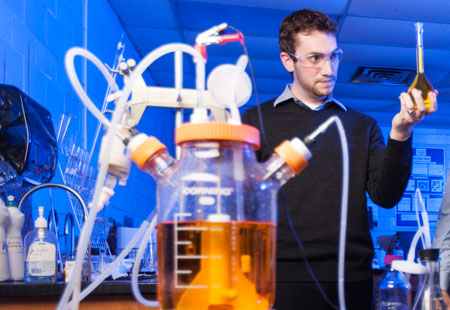$30,000 grant gives students hands-on chemistry experience

The Welch Foundation has approved a grant to Texas Wesleyan University's chemistry faculty in the amount of $30,000 from June 1, 2014 to May 31, 2015 for chemistry research.
The grant gives students an opportunity to study chemistry outside of the structured way. Through the grant, the department will offer faculty/student summer research in chemistry labs. The funding also provides student scholarships for conducting research.
Because of the grant, students are able to research alongside a professor outside the normal scope of their normal studies. The result is that students don't just sit in a classroom and memorize — they learn modern techniques that prepare them for graduate school.
Creating valuable opportunities
The grant gets students outside of the classroom, but it often also gets them outside of the lab. Texas Wesleyan chemistry students often present their findings at national research conferences, where they not only have a chance to show their work, but also to network.
"It's an opportunity our students get that other students at large research universities don't." Phillip Pelphrey, associate professor of chemistry, said.
At a larger university, Pelphrey notes, research opportunities exist, but are often reserved for only the top five percent of students. This grant is like "an in-house internship" for Texas Wesleyan students.
"We focus on getting students engaged in hands-on laboratory exercises and being mentored by Ph.D. faculty so they can produce a body of work for when they leave here and apply to graduate school," Pelphrey said. "That's what these places are looking for. If you have these possibilities for these students, it makes them marketable."
Facilitating critical thinking
Texas Wesleyan has received the Welch Foundation grant for more than 25 years, which is a notable feat for a small university not only because the funding allows for more research, but specifically for the opportunity it provides for students to engage in critical thinking opportunities in a close, faculty-to-student environment.
The Welch Foundation is among the oldest and largest private funding sources for basic chemical research in the U.S. and is based in Houston. The foundation supports chemical research at colleges, universities and other educational institutions in Texas.







